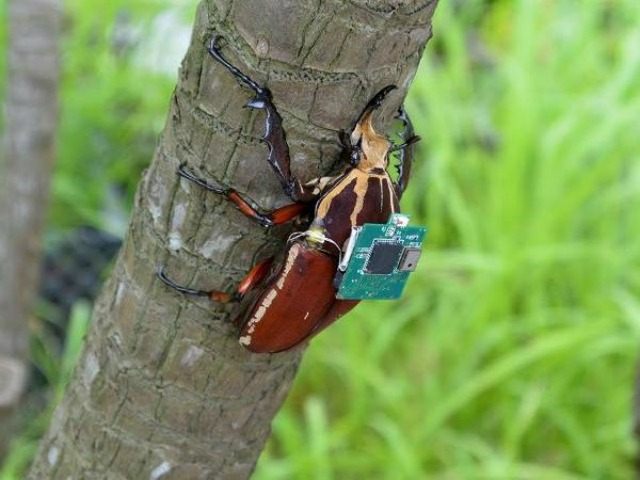Cyborg beetles could become an alternative to drones, as scientists have revealed they can remotely control insects with cybernetic implants.
Engineers at the Nanyang Technological University in Singapore are now testing the use of real insects which they can control remotely.
“Unlike man-made legged robots for which lots of tiny parts, sensors and actuators are manufactured, assembled and integrated, the insect–computer hybrid robots directly use living insects as nature’s ready-made robot platforms,” the researchers wrote in the journal Royal Society Inferface.
The beetles are fitted with electrodes in specific parts of their legs, optic lobes, and flight muscles which can be stimulated by a radio signal to force the insect to follow particular directions.
“By sending a signal to the beetle, we are able to simply change its direction of movement and the beetle will manage the rest,” said the head of the project, Assistant Professor Hirotaka Sato of the NTU School of Mechanical and Aerospace Engineering. “This technology could prove to be an improved alternative to remote-controlled drones as it could go into areas which are not accessible before. For example, it could be used in search-and-rescue missions as it could go into small nooks and crevices in a collapsed building to locate injured survivors.”
The use of insects is also considerably cheaper than the use of normal drones, as little energy is required as the creatures maintain their flight stability on their own. Researchers have trialled the technology in enclosed rooms and will soon begin trials in open air.
Michel Maharbiz, associate professor at UC Berkeley’s Department of Electrical Engineering and Computer Sciences, said, “Our long term vision is to show that we can remotely induce an insect to fly, control its turns when required, and then stop it when the insect reached a set location – all done repeatedly and reliably.”
You can follow Ben Kew on Facebook, on Twitter at @ben_kew or email at ben@yiannopoulos.net

COMMENTS
Please let us know if you're having issues with commenting.